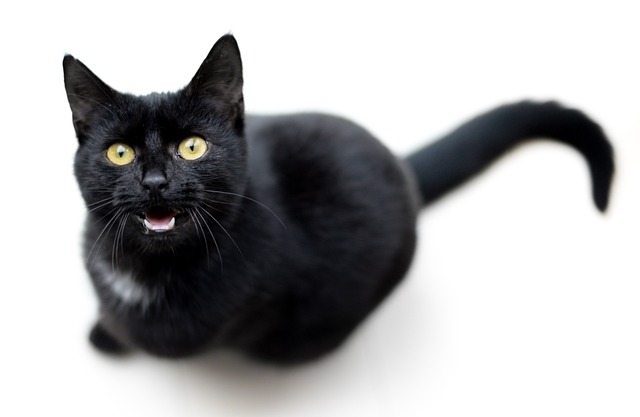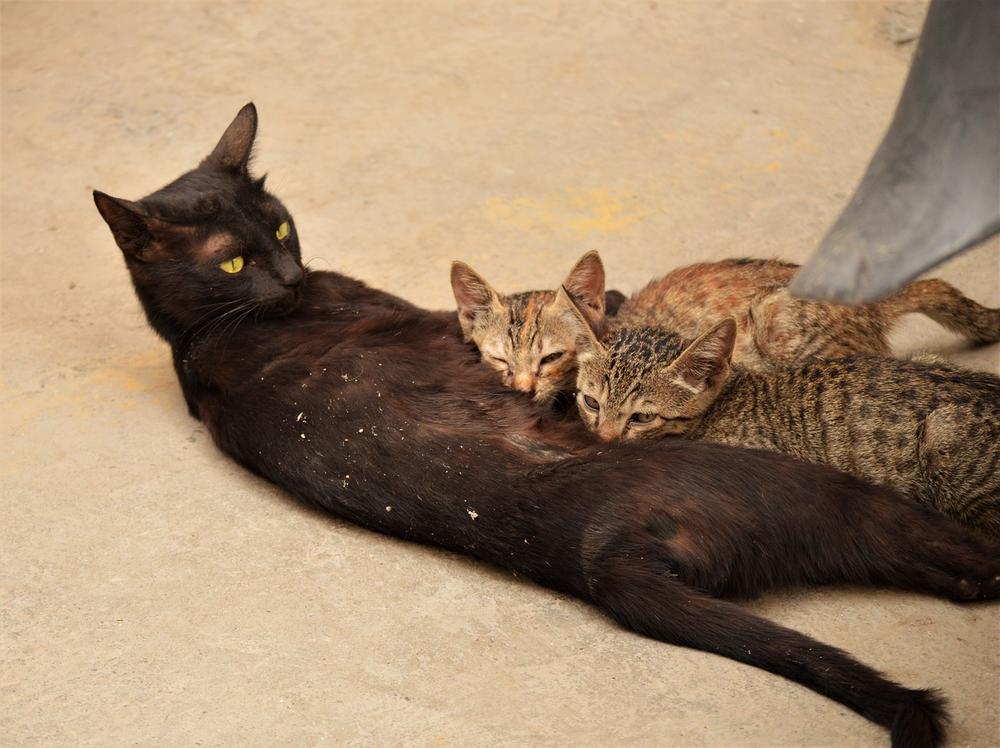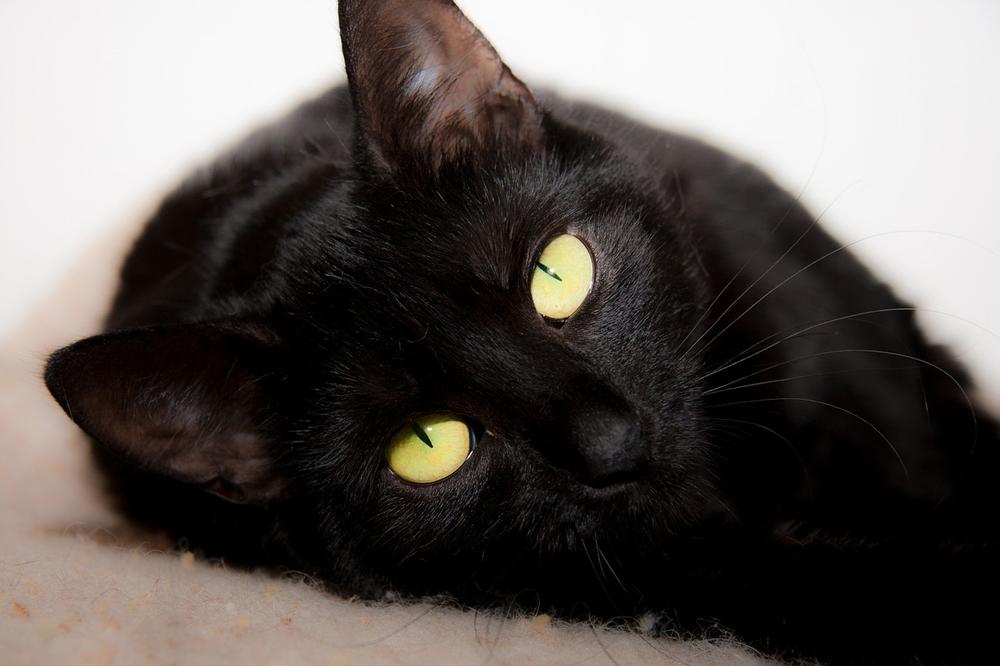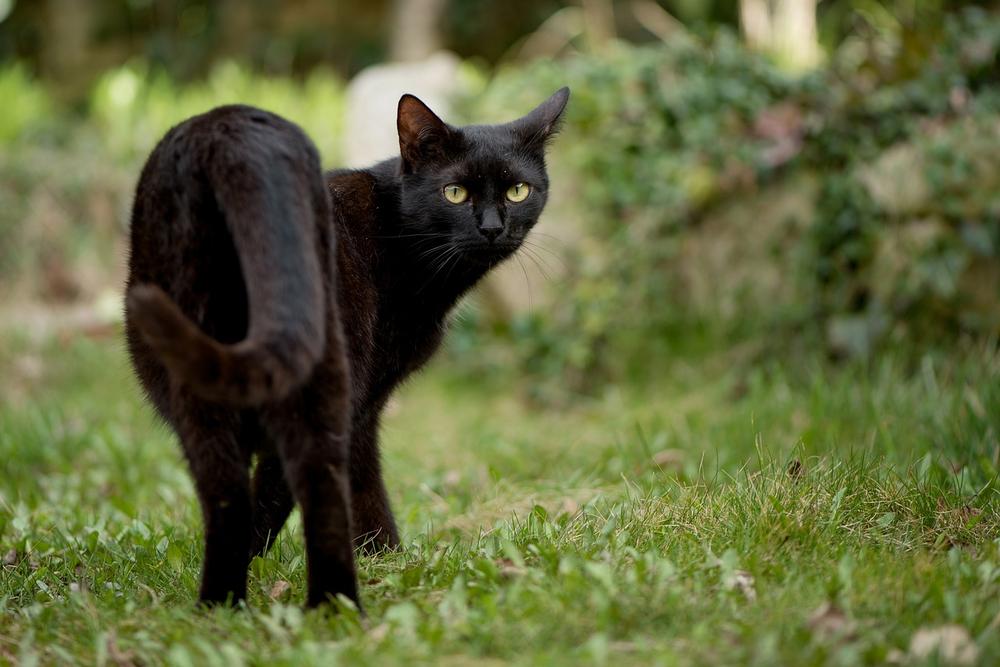Are Black Cats More Vocal?

Let me ask you this:
Have you ever wondered if black cats are more vocal than other cats? 😺
I bet you have, and let me tell you, you're not alone in that curiosity.
But fear not, my friend.
I promise to unravel this mystery for you.
Let's dive in!
Reasons Your Black Cat May Be Vocal
Why does your black cat meow so much?
There are a few reasons for this noisy behavior:
- When your cat is hungry or thirsty, they want to let you know.
- If your home is quiet and lacks excitement, your black cat might meow for attention.
- Unusual meowing could indicate illness or pain, and your feline friend may require medical attention.
- Some black cats develop loud habits due to anxiety, stress, or past trauma.
- Wanting your attention might be another reason for the excessive meowing, especially if they associate it with affection or treats.
- Moving to a new place or introducing new pets can make black cats more vocal as they adapt to their surroundings.
To ensure your black cat's well-being and happiness, address excessive meowing promptly.

Look out for changes in behavior or signs of distress, and if you're concerned about their vocalizations, consult a veterinarian. 😺
And it gets more interesting when we consider the factors that contribute to black cat vocalization.
From health conditions to adaptability and personality traits, there are various elements that shape our furry friends' communication.
Let's dive deeper into these fascinating details and explore how they influence your black cat's vocal behavior...
Factors That Affect Black Cat Vocalization
Here are 12 things that can affect how black cats meow:
- If a black cat has dental problems, hyperthyroidism, or urinary tract infections, it can impact their vocalization.
- Each black cat has their own unique personality traits that can influence how they communicate.
- The way a black cat is brought up and the experiences they have with socialization can also shape their vocal behavior.
- Black cats learn which sounds are effective for communication purposes.
- Mating or aggressive behaviors can affect a black cat's vocalization.
- The surroundings and climate that black cats are exposed to may impact how they meow.
- Street smarts and adaptability to survive in different environments can play a role in a black cat's vocal behavior.
- It's not their color that determines how much they meow, but rather their individual character.
- Some black cats naturally have quieter tendencies when it comes to vocalizing.
- How quickly a black cat adjusts to unfamiliar environments and feels comfortable can influence their vocalization.
- There are uncertain factors that determine whether a black cat will be talkative or not.
- As a black cat owner, understanding different types of vocalizations like meows, purrs, hisses, growls, trills, and chirps is important for you.
And here's an interesting aspect to consider when exploring the vocal behavior of black cats—I personally found that Siamese heritage may play a significant role in determining their chattiness.

The long history of communication between Siamese cats and humans has likely influenced their vocal nature, which also extends to black cats with Siamese traits.
However, it's worth noting that even non-Siamese black cats can be quite talkative too!
Could Breed Be a Factor in Your Black Cat’s Vocalization?
Does your black cat like to talk?
Well, it seems that breed could have something to do with it.
One breed in particular, the Siamese, is known for being quite chatty.
These cats have a history of communicating with humans and that talkative nature can be seen in black cats with Siamese ancestry too.
But get this - even non-Siamese black cats can also be quite vocal!
You see, black cats are pretty rare, making up around half of domestic cat breeds.
Sometimes, their uniqueness comes with a side of chattiness.
So, whether your black cat has Siamese genes or not, don't be surprised if they want to chat with you.
Every cat is different, so their vocal tendencies may vary regardless of their breed.
But what if there are no obvious triggers or changes in the environment?
Why do black cats continue to meow excessively even when everything seems fine?
Let's explore the fascinating world of feline communication and uncover why your black cat may be so vocal...
Is Your Black Cat’s Vocalization a Sign of Anxiety or Stress?
If your black cat won't stop meowing, it's probably because they're stressed or anxious.
Things happening in their surroundings can be a big trigger for these vocalizations.
Stuff like moving houses or introducing new pets can really stress out black cats and make them meow more.
And if your black cat has had bad experiences before, they'll be even more likely to meow out of anxiety.
To figure out why they're meowing, you need to watch their actions before, during, and after.
Look for sudden changes in how they meow or behave, that could mean they're in distress or pain.
Take note of the context and their body language too.
This will help you understand what they're trying to say with their meows, and know how to deal with their anxiety or stress.
Here are some tips for dealing with excessive meowing from black cats:
- Give them a calm and consistent routine so they feel secure.
- Set up a safe space where they can go when they get anxious or overwhelmed.
- Use positive reinforcement to encourage quiet behavior.
- Talk to a vet or animal behaviorist for extra guidance and support.
Tips for Reducing Unwanted Meowing
Black cats can be noisy, but you can help calm them down.
- Play with your cat - Keep them busy and wear them out by using toys or lasers to play together.
- Pay attention to their habits - Understanding your cat's needs and behavior will help manage excessive meowing. Spend time with them and give them things to do.
- Get help from a professional - If the meowing continues, talk to an animal expert who can give you advice and support.
- Take your cat to the vet regularly - Make sure they're healthy by going for check-ups. Health problems can make them meow more.
- Give your cat exercise and interactive toys - Keeping them active and engaged will decrease their vocalization. Use toys that require problem-solving and tap into their hunting instincts.
- Train your cat with rewards - Teach them good behaviors using positive reinforcement instead of punishing them.
- Respect their personal space - Black cats need alone time too. Let them have some privacy to lessen unnecessary meowing.
- Stick to a feeding schedule - Giving them meals at the same times every day will stop them from meowing excessively for food.
- Create a calm routine - Set up a peaceful environment with consistent daily routines to minimize anxiety-related meowing.
Be patient and understanding as you address your cat's vocalizations. Don't do anything that will scare or anger them.
To cut to the chase: Further down the blog post, I'll dive into what excessive vocalization in black cats really means. So keep reading to understand this behavior and how to effectively address it.
And now, let's delve deeper into the wonderful and affectionate nature of black cats, debunking superstitions and shedding light on their true personalities.
I've come to appreciate these enchanting creatures for their unique traits and the joy they bring to our lives...
Are Black Cats More Affectionate?
Black cats aren't always as mysterious as people think.
The color of their coat has no effect on how affectionate they are.
So don't let superstitions fool you, because black cats can be just as loving and playful as any other cat.
In fact, there are some important things to know about black cats that make them excellent pets.
Here's what you should please keep in mind:
- Black cats have outgoing personalities. They're not shy or timid, but confident and friendly.
- These cats absolutely love attention. They'll often seek out cuddles and head rubs from you.
- While they can be sweet, black cats also have a playful side. They enjoy interactive toys, playtime, and chasing after things.
- Sometimes they may act aggressive, but it's important to understand their body language and give them the right training and socialization.
- Their sleek coats not only look beautiful but also add elegance to your home.
- Interestingly, black cats have natural healing powers. Studies show that owning one can help lower your stress levels and promote calmness.
- Black cats communicate through meowing, so respond to their needs and emotions with care. It helps strengthen the bond between you two.
- Don't let superstitions influence your opinion of black cats. Appreciate their beauty and homely nature, and you might even find good luck.
Whether you're thinking of getting a black cat or already have one, cherish and appreciate their unique qualities.
Black cats deserve a little extra love too! ✨
But what about their vocal behavior?
I have a black cat myself, and I've noticed that sometimes he can be quite talkative.
So, does their color have any influence on their meowing habits?
Let's explore the reasons behind their vocalization and what it could mean for our feline friends...
What Is Excessive Vocalization?
Black cats, like mine, can become excessively vocal. If your furry companion starts meowing more frequently and for longer periods, it could indicate an underlying issue. You have to pay attention because this behavior might result from a health problem causing discomfort.

Moreover, stress-related problems may arise if not addressed promptly.
Keep an eye on your feline friend's meowing habits and be attentive to any changes.
Understanding Black Cat Vocalization: Key Takeaways
Summary / Takeaway:
- Black cats may meow extensively for communication and attention-seeking.
- Meowing is a learned behavior that effectively communicates with humans.
- Not all black cats are extremely vocal, as each has its own personality.
- Pain and discomfort can contribute to unusual meowing behavior.
- Factors affecting black cat vocalization include personality, adaptability, and health issues.
- Understanding the various types of vocalizations is essential for black cat owners.
- Siamese traits may make black cats more vocal, but non-Siamese can also be talkative.
- Trauma and past experiences can make black cats more vocal.
- Observing behavior and body language can help decode the meaning behind vocalizations.
- Managing loud meowing can involve tracking habits, seeking help from a behavioralist, and providing enrichment.
- Regular veterinary check-ups are essential for identifying health issues causing excessive meowing.
- Positive reinforcement training techniques can redirect and modify vocal behaviors.
- Respect personal space and establish regular feeding routines to reduce unnecessary vocalizations.
- Black cats have a range of characteristics, including being outgoing and affectionate.
- Superstitions about black cats should be rejected as they breed irrational fears.
And that wraps up today's article.
Before you leave, can I ask you something? Did my blog post help you out? If it did, I'd be so grateful if you could share it with your loved ones. Just click any of the social media buttons to instantly share. Thank you so much!
Talk soon,
-Sarah Davis